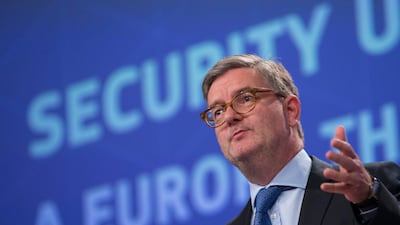Brussels is considering new powers to prevent social media companies spreading “fake news” during election periods, including a crackdown ahead of the May 2019 European Parliament elections.
European security commissioner Sir Julian King is calling for limits on the “harvesting” of personal information for political purposes and more transparency on internal algorithms used by internet platforms to promote stories. He proposes a "more binding approach" than self-regulation.
In a letter to European commissioner for the digital economy Mariya Gabriel, Mr King also said he wants technology companies to reveal who funds “sponsored content” on their websites.
The "psychometric targeting activities" such as those of Cambridge Analytica are just a "preview of the profoundly disturbing effects such disinformation could have on the functioning of liberal democracies", Mr King wrote in a letter dated March 19 and seen by the Financial Times.
“It is clear that the cyber-security threat we are facing is changing from one primarily targeting systems to one that is also increasingly about deploying cyber means to manipulate behaviour, deepen societal divides, subvert our democratic systems and raise questions about our democratic institutions,” the letter adds.
Dutch politician Marietje Schaake warned that a broad online crackdown could backfire if it is viewed as an EU attempt to stifle criticism, the FT reported.
_____________
Read more
Facebook CEO Zuckerberg will not answer UK lawmakers' questions over data scandal
Facebook to sever ties with data brokers in wake of Cambridge Analytica scandal
Facebook losing users' trust amid data breach scandal
_____________
Concerns have been heightened worldwide since whistleblower Christopher Wylie claimed the UK firm Cambridge Analytica scraped the Facebook data from 50 million users to target voters in the US presidential election.
Cambridge Analytica denied the allegations in a March 29 statement, saying its work on the presidential campaign was based on data from five sources including voter files from the Republican National Convention, polling, campaign data from donors and other sources, and consumer data from commercial brokers.
Facebook boss Mark Zuckerberg has apologised for how the social media company handled user data and promised to restrict developers' access. But Mr Zuckerberg refused to answer questions from British lawmakers over how millions of users' data got into the hands of political consultancy Cambridge Analytica, Reuters reported.
Several EU member states are debating "anti-fake news laws" in response to alleged Russian interference in European elections. While British Prime Minister Theresa May has told social media giants to shape up or face fines, France, Germany and Ireland are considering legislation to target fake news.
French President Emmanuel Macron, himself a target of disinformation during his 2017 presidential bid, unveiled plans in January that could allow judges to delete some internet content, block access to websites during elections, and give France’s media regulator the power to remove broadcasters’ rights to air content deemed “fake news”.

